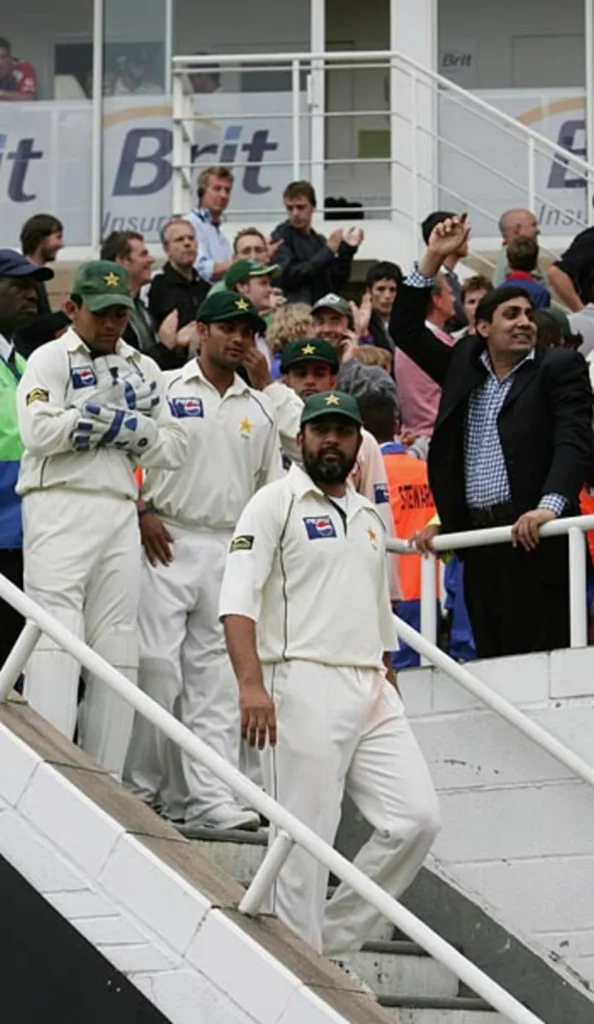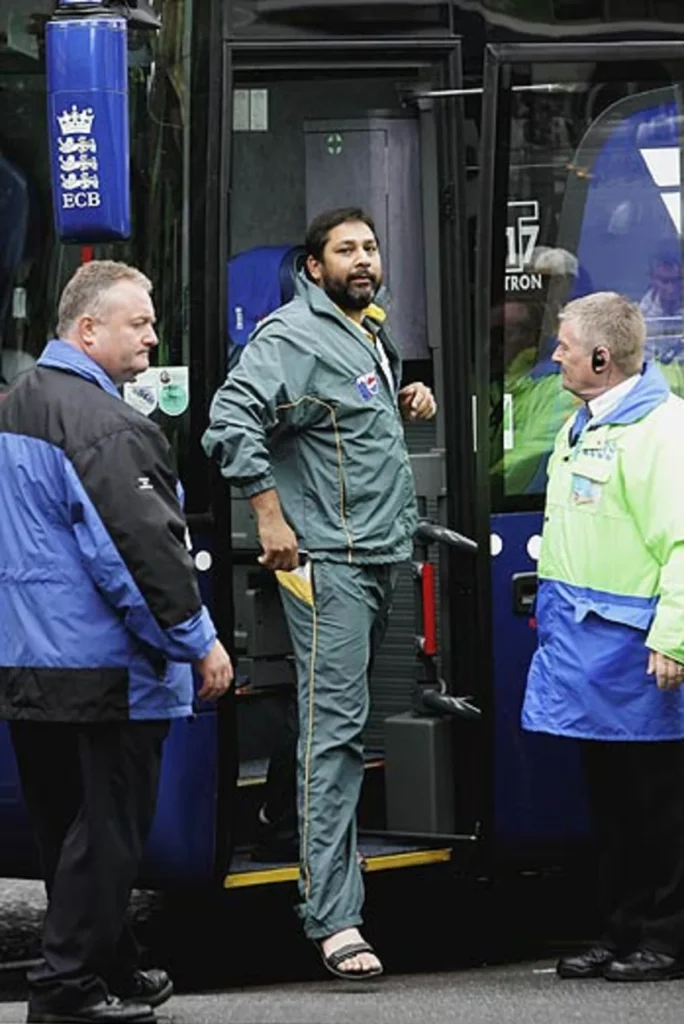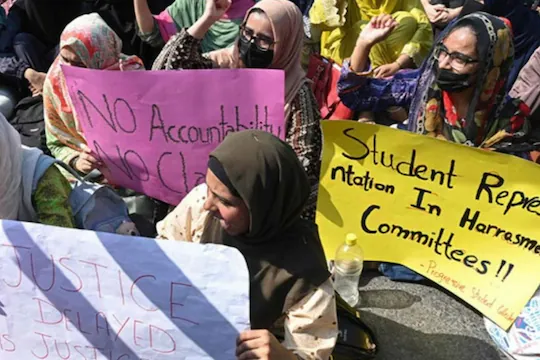The 2006 Oval Test: A Controversial Moment in Cricket History
talha
- 0
While commanding his team during a Test match at The Oval, Inzamam-ul-Haq led the Pakistan cricket team to withdraw gracefully from a Test match against England for the first time in history. It became the first time any of the nations’ cricket teams refused to play in the middle of a match and this became almost a century old sport’s bittersweet moment in more than 1800 tests played over 129 years. The match was also clouded with accusations of… ball tampering, unsportsmanlike conduct of umpires and the issue of sportsmanship, which are still lively debated up to these days.
The Lead-Up: Pakistan’s Dominance
By the time the fourth Test of the series started, Pakistan had its boosters on. They opted to field first and left the English batting order in tatters, where they could only scrape a laughable 173 in the first spell. The English batting order was crippled very early in the match courtesy of the Pakistan bowling department led by Umar Gul and Mohammad Asif who both managed to take 4 wickets each. The fresh batting start was, however, not the case with Pakistan as the bowlers did demolish the top order batsmen, with Mohammad Hafeez (95) and Imran Farhat (91) scoring heavily, and laying the groundwork for a huge score. Towards the end of the innings, Mohammad Yousuf was un perturbed, and contributed further to the high score of 504 runs by Pakistan, giving them a high lead of 331 runs in the match.
At this juncture, the match appeared to be a routine Pakistan win with the approximated winning margins adding up with then. But then, as it is in this game of cricket, it was still to send shockwaves in two days commencing after such events in an unexpected turn of events, the outcome of not just this match but an episode had historical repercussions in the cricketing world.

The Allegation: Ball-Tampering Accusations by Umpire Darrell Hair
In England’s second innings, the home side showed resilience, with Sir Alastair Cook (83) and Kevin Pietersen (96) leading a spirited comeback. By the time England had reached 298/4, still trailing by 35 runs, a moment of high drama unfolded. In the 56th over of the innings, umpire Darrell Hair and fellow umpire Billy Doctrove made a shocking accusation against Pakistan, alleging that the team had tampered with the ball.
The decision to dock five penalty runs from Pakistan’s total for ball-tampering enraged the team. As per ICC regulations, this penalty implied that the umpires believed the ball had been illegally altered. The match continued until the tea break, but it was clear that tensions were boiling over. Inzamam-ul-Haq and his team felt unjustly treated, claiming that they had not been informed about any ball-tampering incident before the penalty was imposed.
Recalling the incident years later, Inzamam shared his perspective on his YouTube channel, “Inzamam-ul-Haq – The Match Winner.” He explained his side of the story, stating, “Darrell Hair awarded five runs to England, implying we had tampered with the ball. But according to ICC rules, the umpire is supposed to inform the captain if such an infraction occurs. I was not told, and I felt our team had been unfairly accused.”
The Forfeit: Pakistan’s Protest and Umpires’ Decision
After the tea break, the Pakistan team refused to take the field in protest against Hair’s decision, sparking a 20-minute delay. Umpires Hair and Doctrove, along with England’s batsmen Paul Collingwood and Ian Bell, waited on the field for Pakistan’s return. Despite requests from the umpires, the Pakistan team remained in the dressing room, signaling their discontent with the ball-tampering allegation.
Inzamam later revealed that he waited deliberately to make a point: “I waited 15-20 minutes to show everyone that the team protested against the decision.” He also felt that had umpire Hair stepped aside, the third umpire could have resumed the game. “If Hair refused to come out, the third umpire should have continued the match,” he said. However, the ICC-backed Hair, and the umpires, bound by protocol, decided to remove the bails and officially declared the match forfeited in England’s favor.
This decision made history as the first-ever forfeited Test match.
Aftermath: Repercussions and Controversy
No sooner had the event occurred than the ICC, ECB, and PCB stated that the verdict given to England on that match was within the Laws of Cricket. However, the consequences of this action did not stop there and lasted for months and years, with players, umpires, and cricket administrators entangled in relentless controversies.
The ICC charged Inzamam-ul-Haq with ball tampering and with conduct that was likely to bring the game into disrepute. Ranjan Madugalle, match referee for the ICC, found Inzamam not guilty of ball tampering, but imposed a ban of four One Day Internationals on Inzamam for bringing the game into disrepute.
Meanwhile, Darrell Hair faced immense scrutiny. In the days following the incident, an email was leaked in which Hair allegedly offered to resign from the ICC’s Elite Umpire Panel in exchange for a one-time payment of US $500,000. Hair insisted that the email reflected negotiations that had been underway before the Oval incident, but it added to the controversy surrounding his role.
The repercussions for Hair did not end there. The ICC later decided not to appoint him to officiate at the 2006 ICC Champions Trophy due to security concerns. Hair was ultimately banned from officiating international matches, though he remained part of the Elite Umpiring Panel. This led to Hair filing a racial discrimination lawsuit against the ICC and PCB in 2007, claiming that he was unfairly singled out while fellow umpire Billy Doctrove, who also officiated the Oval Test, faced no consequences. Hair eventually dropped the case but continued to be a divisive figure in cricketing circles. In 2008, he was briefly reinstated to the Elite Umpiring Panel but resigned just five months later.
The Final Decision: ICC Reinstates the Result
Initially, the PCB pushed for the forfeited result to be overturned. In 2008, two years after the match, the ICC briefly changed the outcome of the Oval Test to a draw. However, this decision was reversed in 2009 after a recommendation from the MCC (Marylebone Cricket Club), and England’s win by forfeiture was reinstated.
The Oval Test remains a symbolic and controversial moment in cricket history, raising critical questions about the integrity of the game, the role of umpires, and how decisions are made on the field. It also highlighted the tension between players and officials when accusations of cheating arise, particularly in high-stakes situations.

Inzamam’s Perspective: “I Did It for Pakistan”
For Inzamam, the decision to protest and not return to the field was made for the pride and dignity of the Pakistan cricket team. Reflecting on the incident nearly 15 years later, Inzamam said, “I took the decision for my country. I felt that we were wronged, and I couldn’t lead the team under those circumstances.”
Despite the bans, fines, and controversy that followed, Inzamam stood by his decision, believing that the integrity of his team was more important than the match itself. “I waited because I wanted everyone to see that the whole team was protesting,” he said, emphasizing that the issue was more about principle than the game.
The Oval Test of 2006 is not only notable for being the first Test match in cricket history to have been forfeited, but it is also notable for the influence it had over people including umpires, players and cricket itself. It brought to the fore certain troubling issues regarding the existing order, and how unfairness, especially where allegations like corruption or ball tampering, deals with the conduct of players.
The Oval Test is more than one decade in the past; however, it still reminds one the paradoxes inherent in the rules of the game of cricket, the relationships among the players and the officials, and the rationales for the actions taken or not taken in those relationships.


